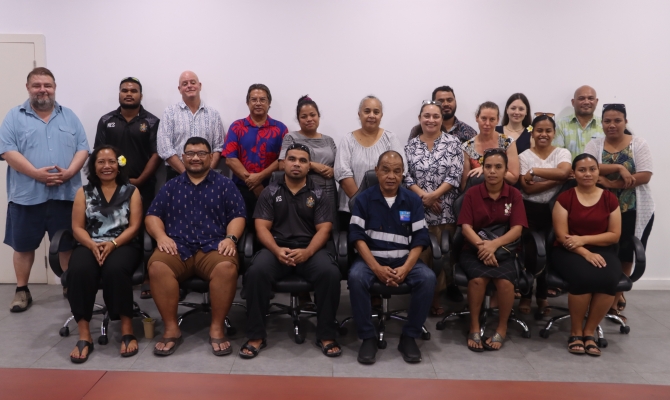
11 July 2024, Nauru – Financing climate change action is expensive, especially so for a Pacific small island developing state like Nauru. Gaining access to available financing for climate change is even more difficult for a country with a population of only 11,000 and without the institutional and human capacity to apply for access to these pools of funds.
This is a challenge that the Nauru Readiness II project, Strengthening Nauru National Designated Authority and Direct Access Entity access, is trying to address. The project aims to strengthen Nauru’s financial management system and processes, institutional and governance arrangements, and capacity in order for the country to have direct access to the Green Climate Fund and ownership in actioning its climate change priorities.
The Secretariat of the Pacific Regional Environment (SPREP) is implementing the Nauru Readiness II project, and Climate Change Adviser, Ms. Filomena Nelson, gave a brief overview of the project and its objectives to start the discussions on the third day of the Nauru National Adaptation Plan and Readiness workshops held in Nauru.
“The objective of this project is to strengthen Nauru’s engagement with, and access to, climate finance from the GCF,” Ms. Nelson said.
“The project will benefit Nauru by strengthening the government’s and different stakeholder agencies’ policies, skillsets, and knowledge, getting them to understand what the GCF is, what the criteria are for accessing climate finance, and basically getting country ready to access climate finance,” she added.
Nauru’s National Designated Authority is the Department of Climate Change and National Resilience, but does not have a Direct Access Entity (DAE) to the GCF. The firm KPMG has been working with the Nauru’s GCF NDA and the Department of Finance (DoF) as part of the Nauru Readiness II project, to assess the capacity of the DoF to identify capacity gaps and needs and develop an accreditation strategy. The Accreditation Strategy will facilitate accreditation of DoF as a national DAE.
“KPMG has been engaged by SPREP to work with the Department to strengthen their financial management system, policies and capacity so they can meet the DAE standards required by GCF,” Ms. Nelson added.
The Readiness II stakeholder workshop followed two days of discussions on initial findings from climate impact, vulnerability and risk and Nauru’s adaptation planning framework.. Today’s workshop also included discussions with stakeholders on project ideas for the two concept notes that will be submitted to the GCF to access climate finance.
One of the projects identified by the Government of Nauru as priorities for seeking financing from the GCF is the Higher Ground Initiative (HGI), a generational undertaking by the Republic of Nauru to respond to projected climate change impacts. The HGI is the single most important adaptation action in Nauru in response to sea level rise that focuses on managed migration from vulnerable shoreline locations to higher elevated Top-side.
The work that the Nauru Readiness II project is carrying out with the Government of Nauru through the DCNR, in collaboration with other government departments, CSOs, private sector and communities aims to pave the way for Nauru to be able to access climate finance from the GCF.
For more information, please contact Mr. Fred Patison at [email protected].